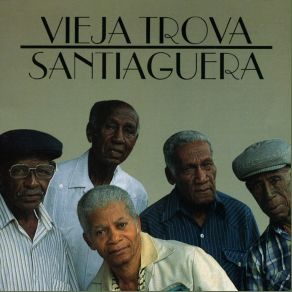Vieja Trova Santiagüera / Vieja Trova Santiaguera
Download links and information about Vieja Trova Santiagüera / Vieja Trova Santiaguera by Vieja Trova Santiaguera. This album was released in 1994 and it belongs to World Music, Latin genres. It contains 15 tracks with total duration of 52:08 minutes.

|
|
|---|---|
| Artist: | Vieja Trova Santiaguera |
| Release date: | 1994 |
| Genre: | World Music, Latin |
| Tracks: | 15 |
| Duration: | 52:08 |
| Buy it NOW at: | |
| Buy on iTunes $9.99 | |
| Buy on Songswave €3.35 | |
Tracks
[Edit]| No. | Title | Length |
|---|---|---|
| 1. | El Tren | 3:38 |
| 2. | Ella y yo | 2:44 |
| 3. | El Paralítico | 3:56 |
| 4. | Blancas Azucenas | 2:48 |
| 5. | ¿ Qué Viste ? | 2:26 |
| 6. | Alma de Roca | 3:38 |
| 7. | El Huerfanito | 3:51 |
| 8. | Retorna | 2:20 |
| 9. | Capullito de Alhelí | 4:58 |
| 10. | Lágrimas Negras | 3:28 |
| 11. | ¿ Dime, por Qué no me Quieres ? | 2:27 |
| 12. | Olvido | 4:46 |
| 13. | Son de la Loma | 4:16 |
| 14. | Mujer Perjura | 2:41 |
| 15. | Esperanza | 4:11 |
Details
[Edit]The Cuban quintet Vieja Trova Santiaguera is legendary among their countrymen and women for their deep interpretations of Cuba's historical song and dance forms: sons, boleros, and guarachas, some of them dating back to the 19th century. Although these men are all senior citizens, and only began playing together in 1990, from the time of their first recordings to the last of the original members in 2000, they were revered throughout Cuba for their stellar performances, virtuoso musicianship, and their dedication to the original spirit of the music of their homeland. Again, there must be a great "thank you" to the Buena Vista Social Club for having made it possible — and financially feasible — for record companies to dig deep into the roots of Cuban music for its authentic origins and how well they've translated to modern times. This two-CD collection features Vieja Trova Santiaguera's earliest recordings from 1993 — after they had rehearsed and performed together for three years (contrast this with American rock bands who play together a month and are heading for the studio to make their "statement). All five members had previously been members of some of the island's most noteworthy ensembles: Cuarteto Patria, Orquesta la Moderna Tradicion, La Estudiantina Invasora (founded in 1927 and still going strong), Orquesta Chepin-Chovin, and others. They came together to reinvestigate the old music, to hear it and play it with the integrity in which it was written and they had learned it through their lives. Disc one is a collection of their most popular material. It is equally divided among the three song and dance styles with harmonies and guitars vying for the front line with small percussion instruments keeping and trading rhythms through the bridges. Disc two is, in many ways, the more revealing of the two as it features concert excerpts with unedited crowd response that borders on the spiritually ecstatic, unreleased songs, alternate takes, and demos of songs that are so old the origins of them are unknown. On these sides you can hear these fine musicians — Reynaldo Creagh (lead vocals and claves), Pancho Cobas (guitar and vocals), Aristoteles Limonta (bass), Amado Machado (vocals, maracas, and vocal improvisations), and the great Reinaldo Hierrezuelo (tres, flutes, vocals and chorus) — joyously tussle with material that has all but lost its meaning from neglect. They edge ever closer, sometimes succeeding, sometimes failing, to bring to life the corpse of a formerly loved song. It's as if they try to piece memory, research, emotion, and arrangement together to come up with something authentic, plausible. If they don't make it, they discard the song sorrowfully. The finished tracks that remain unreleased are finally out of the can as they are as fine as anything previously issued. In all, this is Cuban folk music without any Hollywood treatment. It holds together like one body because it is the lifeblood of a people whose heritage is so rich, so deeply hewn in its country's soil that it runs like blood from the veins of its musicians. This is one of the greatest offerings yet from any label seeking to unearth the authentic folk music of Cuba.